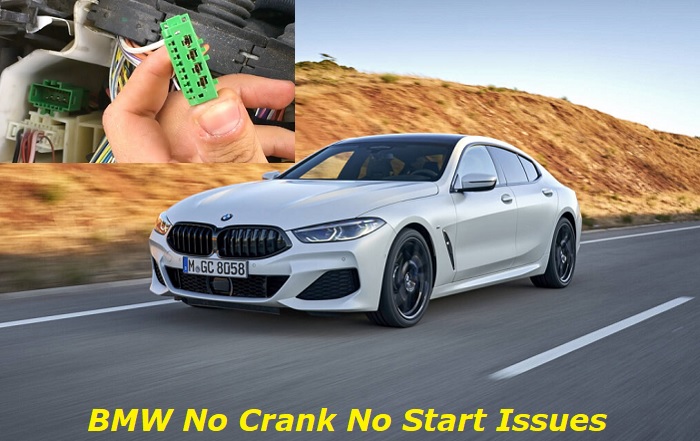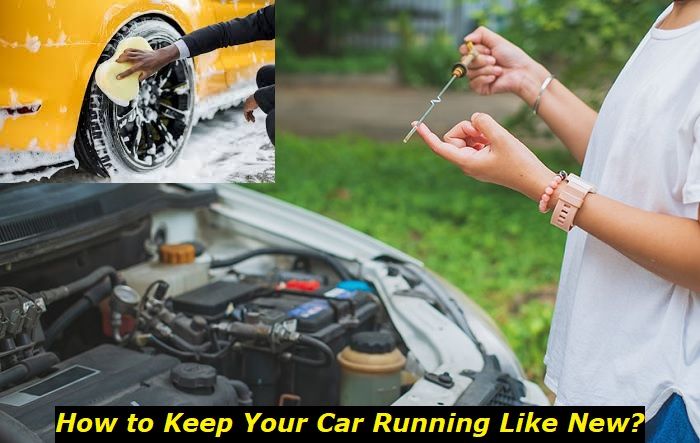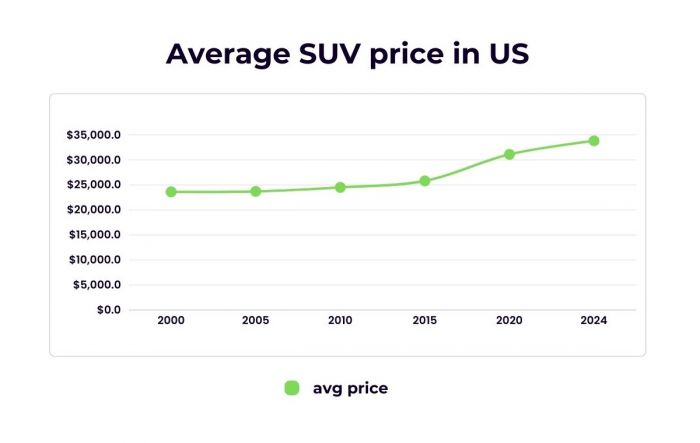When your BMW doesn't start, frustration is not enough to describe how you feel. Nearly every car owner out there faces this problem. In simple terms, the "no crank, no start" phenomenon means that the car engine is unresponsive to pressing the start button or turning the key in the ignition.
No-power problems highlights
- Level of urgency:high
- DIY inspection:possible but complicated
- DIY repairs:possible but often complicated
- Can you drive?no
- Price of repairs:$50 - $250
- If ignored:no-start, nothing works
- Ways to fix:check the battery, connections, fuses

What Are the Common Symptoms?
Your BMW may give some warning signals when it doesn't start. Here are some of them to take note of:
- Your BMW car won't start when you push the start button.
- All the lights in your BMW are off or dead, and nothing happens when you insert the Key.
- Your car's engine makes a clicking noise and won't turn over.
- Changing the battery doesn't make it start.
- Your BMW vehicle won't start in the cold.
- BMW won't start with the EML lights on.
- The BMW won't start even with the lights flashing.
Common Causes
There are several reasons why your BMW may not start. The following are some of them:
Battery Issues: A Dead or Weak Car Battery
A dead or weak car battery is one of the most frequently encountered reasons your BMW vehicle won't start.
Use a battery tester to confirm whether your car's battery is weak.
If you don't have a battery tester, we recommend jumpstarting your car using jumper cables. If it is successful, allow the vehicle to run for some time so that the alternator can recharge the battery.
If the fault is from a dead battery, another helpful sign that'll help you confirm it is that your dashboard and lights will not power up when you start the vehicle. The car won't make any noise, and the radio is silent.
Check your battery posts and wipe them down so that they are clean and the connection is complete.
How to Fix Battery Problems
- Jumpstart the battery
- Charge the BMW battery.
Jumpstarting the battery means using the battery from another vehicle to power your weakened battery using jumper cables. You do this through a temporary connection that recharges your dead battery.
Make sure you utilize the jumpstarting terminals that are underneath the hood. Furthermore, don't connect the cables to the battery directly.
Additionally, charging your BMW battery with a trickle charger is another option. You need between 5 hours and 24 hours to complete the procedure.
After fully charging the battery, your BMW should have no problem starting if a dead battery was the problem. If you still have the same issues after some days, your battery has problems retaining a charge.
The problem is a parasitic drain if it's a new battery. You'll need to replace the battery with another one to solve the problem or just locate the drain. If your BMW car battery is more than seven years old, you should change it.
Fuel Pump Failure
Be careful: if the fuel pump is the issue, the engine will still crank, but it won't start without a proper supply of fuel.
The fuel pump supplies the engine with the appropriate quantity of fuel at all times. A bad fuel pump, fuel injector, or a break in the fuel line can also make your BMW not start.
When there's a vital and hot spark when you crank your BMW car engine, but your vehicle doesn't start, examine the fuel because the problem may be a bad fuel pump.
Use a pressure gauge to check for pressure in the line. Connect it to the fuel rail.
If the Key is on, but there's no pressure in the line, examine the pump or the relay. That is to see if the fuel pump or relay has failed.
Obstructions in the fuel pickup sock or fuel line in the tank can also lead to a lack of fuel. Water or alcohol may have contaminated the fuel in the tank. Therefore, the bad gas will make your BMW not start.
A significant vacuum leak can also keep your BMW engine from starting. That's because the vacuum leak will deplete the air/fuel ratio, so the mixture won't ignite.
Examine all the vacuum connections and, while cranking, pay attention to unusual sucking noises.
How to Fix
- The solution to a broken fuel pump is to replace it with a new one.
- Remove any obstructions in the fuel line.
Broken Fuses/Relays
When you have blown a fuse or the relay is bad, your BMW vehicle won't start. You can quickly check your fuse to confirm whether or not it is terrible.
Remove and inspect it visually and assess it using a digital multimeter. The following are the sites where you can locate the fuse:
- Under or at the side of the dashboard.
- The engine bay.
- In the trunk.
Do not check the BMW fuses if the Key is inside your car's ignition. The fuses that you need to remove and assess include:
- The starter fuse/security fuse/relay immobilizer.
- The fuel pump fuse/relay.
- Alarm system.
- Engine Electronics Fuse/DME/DDE.
- Ignition switch control.
- Main relay.
- Central locking system.
- Engine control module (ECM).
How to Fix Bad Fuses or Relays
- Replace bad fuses or relays.
Bad Spark Plugs/Ignition Coils
Be careful, in the case of bad spark plugs or coils, the engine will still crank but won't start.
If your BMW is not starting, your spark plugs or ignition coils may be impaired. How will you know that they ate severely? Here are some signs to look out for:
- Your BMW vehicle won't start.
- Power failure or loss.
- The fuel economy is poor.
- A misfiring engine
If it's discovered that there is no spark, the possible causes include:
- A bad ignition coil.
- A flooded engine
- A faulty crank position sensor
- Bad spark plugs.
- Issues in the ignition circuit. For example, the wiring and security system.
- A bad ignition switch.
How to Fix
- Check the spark plugs and if they are spoilt, replace them.
- If you replace them, but your BMW still won't start, make sure you connect all the wire harnesses properly.
- Make sure you don't swap the wires between the ignition coils because you need to connect all the wires in the ignition coil to the same ignition coil you removed.
- Removing the spark plugs and cleaning them may also work.
A Defective Starter
If your starter is bad, your engine won't turn over, and your BMW won't start. It's a common problem, especially with older vehicles with high mileage.
Common causes include:
- A dead battery.
- A bad ignition switch from wear and tear forces.
- The solenoid or the starter motor is bad.
- The car's security protocol or the electronic control module may stop the starter from working.
- The wire for the solenoid control may have spoiled.
- The neutral safety switch may have problems.
How to Fix
- In most cases, you will need to replace your faulty starter.
- Take your BMW vehicle to the auto mechanic for repair.
Damaged Key
If your Key is defective, then your car may not start. It may even unlock your vehicle but won't start it. The most common cause of this problem is keeping your Key in a wet or humid environment.
How to Fix
- Keep your BMW key where it won't get wet.
- Take your spare Key and check to see if it will start your BMW.
The Key Won't Turn Inside the Ignition
The possible reasons why this is happening include:
- The ignition lock restricted the steering, and the front wheels turned to the side.
- The Key or ignition lock problems.
How to Fix
- Attempt to rotate the wheel to the right and left as you jiggle the ignition key gently. That'll help to release the lock on the steering wheel.
- The lock mechanism and the Key may have worn out with extensive use. Lubricate the critical slot with WD-40.
- Visit your auto dealer for professional help.
Final Thoughts
Automobiles form a critical part of a car owner's life as they help to provide mobility. That's why it can get very annoying when your BMW doesn't crank and doesn't start. However, with this knowledge, we believe you can diagnose this problem and fix it yourself, as the case may be. Remember to consult your owner's manual and the auto dealer when you're confused about something, so you don't worsen a small problem.
About the authors
The CarAraC research team is composed of seasoned auto mechanics and automotive industry professionals, including individuals with advanced degrees and certifications in their field. Our team members boast prestigious credentials, reflecting their extensive knowledge and skills. These qualifications include: IMI: Institute of the Motor Industry, ASE-Certified Master Automobile Technicians; Coventry University, Graduate of MA in Automotive Journalism; Politecnico di Torino, Italy, MS Automotive Engineering; Ss. Cyril and Methodius University in Skopje, Mechanical University in Skopje; TOC Automotive College; DHA Suffa University, Department of Mechanical Engineering






Add comment